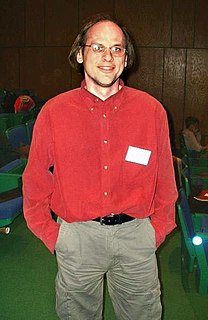A Quote by Richard Dawkins
For centuries the most powerful argument for God's existence from the physical world was the so-called argument from design: Living things are so beautiful and elegant and so apparently purposeful, they could only have been made by an intelligent designer. But [Charles] Darwin provided a simpler explanation. His way is a gradual, incremental improvement starting from very simple beginnings and working up step by tiny incremental step to more complexity, more elegance, more adaptive perfection.
Quote Topics
Adaptive
Apparently
Argument
Beautiful
Been
Beginnings
Centuries
Charles
Complexity
Could
Darwin
Design
Designer
Elegance
Elegant
Existence
Explanation
God
Gradual
His
His Way
Improvement
Incremental
Intelligent
Intelligent Design
Living
Living Thing
Living Things
Made
More
Most
Most Powerful
Only
Perfection
Physical
Physical World
Powerful
Provided
Purposeful
Simple
Simpler
So-Called
Starting
Step
Things
Tiny
Up
Very
Way
Working
World
Related Quotes
The assumed instinctive belief in God has been used by many persons as an argument for his existence. But this is a rash argument, as we should thus be compelled to believe in the existence of many cruel and malignant spirits, only a little more powerful than man; for the belief in them is far more general than in a beneficent deity.
It is important to notice that these badly functioning designs were praised for 'elegance.' But elegance as theoretical scientists apply it is quite different. The elegance of a mathematical formula is that it explains a phenomenon beautifully, with no parts left over. In design, elegance is more readily perceived as a property of product than of process. If we had more elegant theories, we might look to design for more than elegance.
Evolution as described by Charles Darwin is an scientific theory, abundantly reconfirmed, explaining physical phenomena by physical causes. Intelligent Design is a faith-based initiative in rhetorical argument. Should we teach I.D. in America's public schools? Yes, let's do - not as science, but alongside other spiritual beliefs, such as Islam, Zoroastrianism and the Hindu Idea that Earth rests on Chukwa, the giant turtle.
Beauty means a lot of different things to a lot of different people. A lot of different ways in which things can be beautiful. But this really has a very specific meaning and which is more along the lines of elegance which is that we say an idea is beautiful or elegant in mathematics or physics if a very simple principle or a very simple idea, or simple set of ideas, turns out to be very powerful and leads to all sort of unexpected structure and unexpected predictions.
I don't think God is an explanation at all. It's simply redescribing the problem. We are trying to understand how we have got a complicated world, and we have an explanation in terms of a slightly simpler world, and we explain that in terms of a slightly simpler world and it all hangs together down to an ultimately simple world. Now, God is not an explanation of that kind. God himself cannot be simple if he has power to do all the things he is supposed to do.
The argument for collectivism is simple if false; it is an immediate emotional argument. The argument for individualism is subtle and sophisticated; it is an indirect rational argument. And the emotional faculties are more highly developed in most men than the rational, paradoxically or especially even in those who regard themselves as intellectuals.
Here is the cosmological proof of the existence of God - the design argument of Paley - updated and refurbished. The fine tuning of the universe provides prima facie evidence of deistic design. Take your choice: blind chance that requires multitudes of universes or design that requires only one.... Many scientists, when they admit their views, incline toward the teleological or design argument.
An atheist before Darwin could have said, following Hume: I have no explanation for complex biological design. All I know is that God isn't a good explanation, so we must wait and hope that somebody comes up with a better one. I can't help feeling that such a position, though logically sound, would have left one feeling pretty unsatisfied, and that although atheism might have been logically tenable before Darwin, Darwin made it possible to be an intellectually fulfilled atheist.
The love of experiment was very strong in him [Charles Darwin], and I can remember the way he would say, "I shan't be easy till I have tried it," as if an outside force were driving him. He enjoyed experimenting much more than work which only entailed reasoning, and when he was engaged on one of his books which required argument and the marshalling of facts, he felt experimental work to be a rest or holiday.
One thing we know: Things will become even more destabilized if we don't step up Sino-U.S. cooperation. If you want to envisage a worst-case scenario, it is that Putin reveals step by step the inner weaknesses of the West, particularly in Europe, and the Chinese see in that an opportunity for emulation in the Far East, and then step by step through a gradual process we will be witnessing the emergence of Sino-Russian partnership in favor of a drastic change in the global balance of power.
I have a great respect for incremental improvement, and I've done that sort of thing in my life, but I've always been attracted to the more revolutionary changes. I don't know why. Because they're harder. They're much more stressful emotionally. And you usually go through a period where everybody tells you that you've completely failed.
In a few more days we will celebrate Xmas, the day we commemorate the birth of you-know-who. ...It seems the modern consensus of enlightened people that his name should be used in polite society only when cursing.... [P]oliticians are often eager to associate themselves personally with you-know-who, even -- and especially -- when they rather flagrantly ignore his injunctions.... He was out of step then, and he is out of step now. He is eternally out of step, and eternally more powerful than those who keep in step. You know who I mean.

































